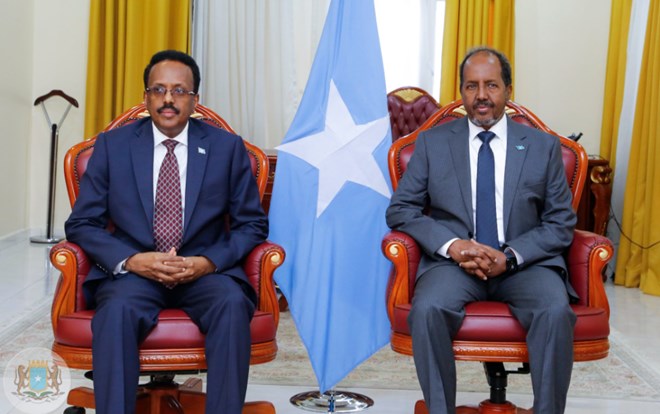
Ahmed Mohamed
Monday May 23, 2022

MOGADISHU, SOMALIA — Somalia’s
new president is starting his four-year term facing familiar top issues such as
the country’s political divide and rising attacks by al-Qaida-linked insurgent
group al-Shabab.
As he settles into office, President Hassan Sheikh Mohamud
faces a politically divided nation, high public expectations and the specter of
al-Shabab, which has remained a potent threat since it emerged in 2007.
Fawzia Yusuf, a former deputy prime minister who ran for
president in the just concluded elections, said the new president has the
uphill task of constituting a competent government given the many competing
interests.
“Since our system is currently based on tribal 4.5, people
are expecting him to choose people from different tribes,” she said. “So, one
of the challenges is putting together a very strong Cabinet, which are
technocrats which are not based on tribal but on meritocracy.”
The distribution of power in Somalia is on a clan-based
system locally known as the 4.5 system, where majority clans are allocated
majority seats in parliament while the smaller clans, grouped together, get the
remainder.
In the coming days, the president is expected to name a new
prime minister who will need parliamentary approval before proceeding to name a
Cabinet.
Besides tackling the political question, Mohamud must
contend with the security threats posed by militant group al-Shabab.
According to Abdurahman Sheikh Azhari, the director of the
Mogadishu-based Center for Analysis and Strategic Studies, the new president,
like his predecessor, doesn’t have much leeway in dealing with al-Shabab.
“Of course, al-Shabab's fighting, and attacks will continue
as long as they are able or capable of carrying out attacks,” he said. Azhari
added he thinks the opportunities for the president are slim because al-Shabab
is a terrorist organization, an international organization, and a regional
organization, and this means they will not surrender easily.
Azhari argued that despite the lack of incentive from
al-Shabab to negotiate due to its successful attacks in recent months, dialogue
is still a possible option.
"I think the government, with the help of international
and regional partners, can negotiate indirectly with sections of the al-Shabab
leadership who may want to surrender or oppose the organization,” he said.
Yusuf, too, shares a similar view that the new president may
need to consider taking a different approach by opening lines of communication
with the militant group.
“Another challenge, as I said, is the security,” he said.
“The security is a major problem. Al-Shabab is a major problem, and their
demand is to get rid of the foreign forces, in other words, the ATMIS or troops
coming from the contributing countries. So, dealing with them is not an easy
matter. Never in the world has a rebellion or terrorist groups won, but they
still weaken any administration. So, I think the best thing he can do is to
start negotiating with them and deal with the hard-core groups.”
By ATMIS, Yusuf was referring to the U.N.-authorized African
Union Transition Mission in Somalia. Its mandate includes reducing the threat
posed by al-Shabab and conducting a phased handover of security responsibilities
to Somalia. ATMIS is expected to end its mission in 2024.
Having had the backing of most opposition candidates during
the May 15 vote, Mohamud now has to avoid a fallout while ensuring he puts in
place a competent team to deliver his election promises.
Analysts say the new leader could take advantage of the
planned return of U.S. forces to the country to bolster the war against
al-Shabab and strengthen the national army. For now, the country is waiting to
see who Mohamud will pick as prime minister.
Harun Maruf and
Hussein Hassan Dhaqane contributed to this report.